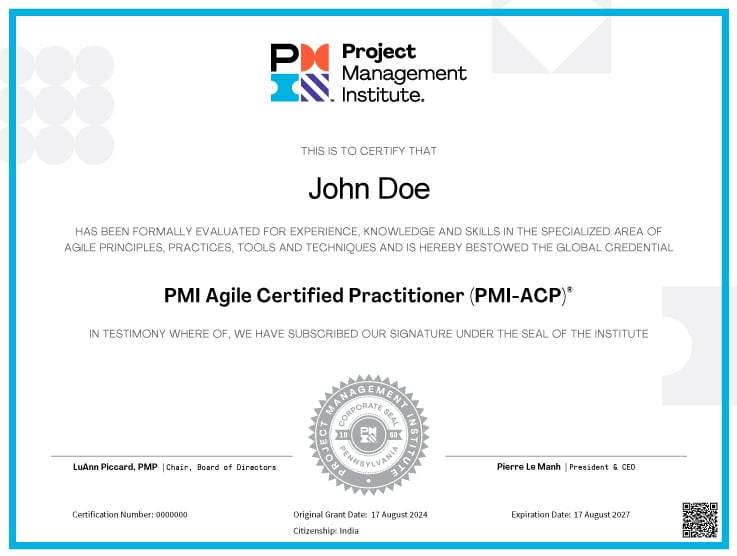A Detailed Overview of PMI-ACP Certification Course Syllabus
The PMI-ACP certification syllabus consists of all the minute details about PMI-ACP (Agile Certified Practitioner). This PMI - ACP curriculum will let you understand how well the course fits into your career path. There are many benefits of PMI-ACP certification to project managers, thus mastering all relevant concepts is crucial to succeed in the field. Let us have a look at the syllabus:
Agile Foundation
- Agile Foundation Introduction
- Agile Development Overview
- When is Agile Appropriate
- Agile Manifesto
- Key Values for Agile Leaders
- The Agile Triangle
- APM Framework
- Envision Phase
- Speculate Phase
- Explore Phase
- Adapt Phase
- Close Phase
Agile Fundamentals
- ThemesProject Charter
- Product Roadmap
- Product Backlog
- Minimally Marketable Feature (MMF)
- Value-Based Prioritization
- Product Backlog Grooming
- User Stories
- Personas
- Story Maps
- Epics
Value-Based Prioritization
- Time Value of Money
- Return On Investment (ROI)
- Present Value (PV), Net Present Value (NPV)
- Internal Rate of Return (IRR)
- Opportunity Cost (OC)
- Payback Period
- Prioritization
- Customer Valued Prioritization
- Minimally Marketable Feature (MMF)
- Agile Compliance
- Business Case Development
Agile Methodologies
- Methodologies Introduction
- Scrum Introduction
- Sprint Planning Meeting
- Sprint Goal
- Modeling
- Sprint Backlog
- Daily Scrum Meeting
- Sprint Review Meeting
- Retrospective
- Scrum of Scrums
- The Scrum Team
- Extreme Programming (XP)
- Lean Software Development
Agile Communications
- Communications Management
- Co-location/Distributed Teams
- Team Space
- Osmotic Communications
- Agile Tooling
- Information Radiators
- Task/Kanban Board
- Work in Progress (WIP) Limits
- Cumulative Flow Diagram
- Sprint Burndown Chart
- Release Burnup Chart
Agile Estimating
- Relative Sizing
- Story Points
- Wideband Delphi Technique
- Planning Poker
- Consensus Building
- Velocity
- Cycle Time
- Ideal Day, Ideal Time
- Affinity Estimating
- Agile Cost Estimation
Planning, Monitoring and Adapting
- Time-Boxing
- Multiple Levels of Planning
- Release Planning
- Iteration Planning
- Release Plan Vs Iteration Plan
- Daily Standup
- Burndown Chart / Burnup Chart
- Variance and Trend Analysis
- Cumulative Flow Diagram
- Agile Task Board
- Kanban Board
- WIP Limits
Product Quality
- Quality in Agile
- Project and Quality Standard in Agile
- Agile Testing Quadrants
- Frequent Verification and Validation
- Test First Development (TFD) / Test Driven Development (TDD)
- Acceptance Test-Driven Development (ATDD)
- Continuous Integration (CI)
- Refactoring
- Definition of Done (DoD)
- Collection Code Ownership
- Knowledge Sharing
- Technical Debt
Agile Risk Management
- Risk as Prioritization Factor
- Risk Management in Agile
- Risk-Adjusted Product Backlog
- Expected Monetary Value
- Risk Management
- Risk Burn-down Chart
- Risk-Based Spike
Agile Metrics
- Agile Earned Value Management (Agile EVM)
- Test-Driven Development (TDD)
- Unit Testing
- Acceptance Testing
- Frequent Verification and Validation
- Escaped Defects
- Risk-Adjusted Backlog
- Risk Burn-Down Chart
Process Improvement
- Value and Non-Value
- Value Stream Mapping
- Waste in Software Development
- Retrospectives
- Control limit for agile projects
- Process Analysis
- Process improvements
- Agile failure modes
- Agile coach failure and success modes
- Agile Process Tailoring
Agile Leadership
- Leadership Theories
- Knowledge Sharing
- Active Listening
- Brainstorming
- Emotional Intelligence
- Conflict Resolution
- Negotiation
- Stakeholder Management
- Coaching and Mentoring
Agile Contracts and Accounting Principles
- Value-Based Analysis
- Burn Rate
- Compliance
- Tools
- Monday.com
- JIRA
- Trello
- Wrike
- Pivotal Tracker
- Zoho Sprints
- Kanbanize
- ProofHub
- Ravetree
- Nostromo
Agile Project Management Overview
- Intro Agile methods -Scrum, XP, FDD, Lean SW Development, etc
- Agile Manifesto
- Agile principles
- Scrum overview
Scrum – Key Artifacts and Roles
- Scrum Characteristics
- Scrum Roles-Product Owner, Scrum Master, Team
- Scrum planning horizons: Product Release, Iteration
- Product and sprint backlog
- Sprint Planning meeting
- Review and Retrospectives
User Stories
- The anatomy
- Development techniques
- Story points
- Ideal time
- Wide band delphi
- Planning poker
Sprint Planning Meeting
- Sprint Goal
- Time box
- Prioritization of features
- The tracking board
- Definition of done
- Load balancing
- Sprinting
- Self-organized teams
- Work volunteering
- Daily stand up meetings
- Information Radiator
- Burn down chart updation
- CI process -Sprint demo meetings
- Velocity
- Retrospectives And Showcases
- Scaling scrum
- Co-located and distributed teams
Soft skills
- Negotiation
- Emotional intelligence
- Collaboration
- Adaptive leadership
- Conflict resolution
- Servant leadership
- Building high performance teams
Agile implementation
- Agile contracting methods
- Agile project accounting principles
- Control limits for Agile projects
- Compliance (Organization)
- Regulatory compliance
- Applying new agile practices
- Variance and trend analysis
- Failure modes and alternatives
- Globalization, Culture and team diversity
- Innovation games
- Vendor management
Best practices and concepts
- Agile tooling
- Chartering
- Osmotic communications
- Road map-Product
- CFD -Cumulative flow diagram
- Process tailoring
- Story maps
- Affinity estimating
- Limits of WIP
- Wire frames
- Frequent verification and validation
- Test driven development / test first development
- Continuous integration
- Project charter for an agile project
- Participatory decision models
- Process analysis techniques
- Self assessment
- Value based assessment
Upon completion of the PMI-ACP Certification Curriculum, you will gain a deep understanding of crucial concepts such as interpersonal skills, on-time delivery, conflict relationships, and risk management. These are not just theoretical knowledge but practical skills that you can apply in your project management roles.


_1736502113.png)

_1736502113.png)




_1733727073.jpg)





_1733737932.jpg)




_1733726656.jpg)











_1733727550.jpg)






_1733726982.jpg)









_1733727322.jpg)






_1733726524.jpg)









_1733727073.jpg)





_1733737932.jpg)




_1733726656.jpg)











_1733727550.jpg)






_1733726982.jpg)









_1733727322.jpg)






_1733726524.jpg)








